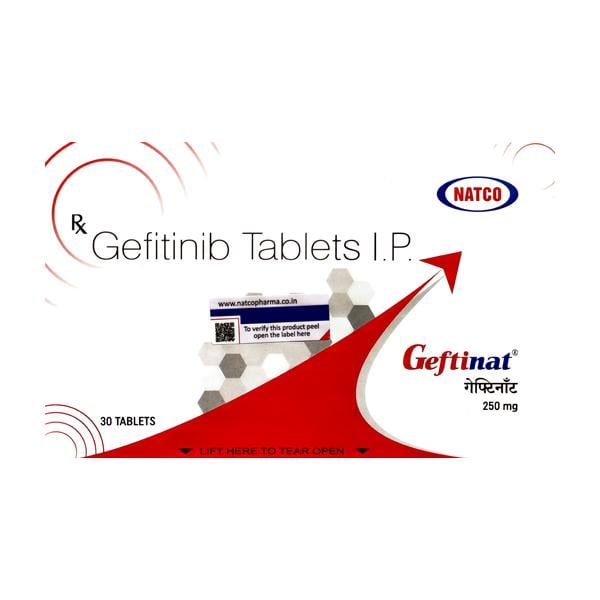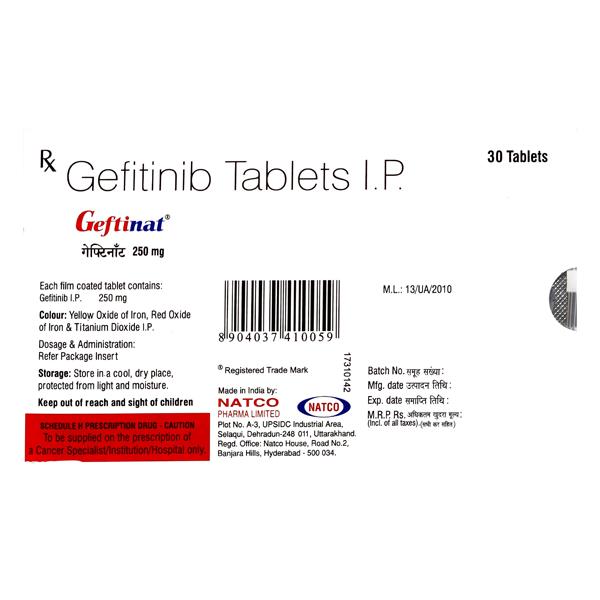

Netmeds First Membership
Quick Links
Introduction About GEFTINAT 250MG TABLET
GEFTINAT 250MG TABLET contains Gefitinib which belongs to the group of medicines called Antineoplastics. It is indicated in adults for the management of locally advanced or metastatic non-small cell lung cancer (NSCLC) who have activating mutation of the EGFR-TK.
It is generally characterized by symptoms such as chest pain or discomfort, persistent cough, trouble breathing, wheezing, tiredness and difficulty while swallowing which may be diagnosed as any of its type as adenocarcinoma (cancer involving the outer part of the lung), squamous cell carcinoma (cancer occurring in the centre part of the lungs) and large cell carcinoma (cancer that can occur in any part of the lung).
Along with this management, your doctor might ask you to take liver function test to assess your liver function.
GEFTINAT 250MG TABLET is not recommended for use in patients who are allergic to Gefitinib. Before taking GEFTINAT 250MG TABLET, inform your doctor if you have other lung problems, liver or kidney problems.
GEFTINAT 250MG TABLET is not recommended for use in pregnant and breastfeeding women. It is not recommended for use in children and adolescents (aged below 18 years). Consult your doctor before taking GEFTINAT 250MG TABLET.
The most common side effects of taking GEFTINAT 250MG TABLET are diarrhoea, vomiting, nausea, skin reactions, loss of appetite, weakness and red or sore mouth. Consult with your doctor if any of the symptoms worsen.
Uses Of GEFTINAT 250MG TABLET
- Used to manage adults with non-small cell lung cancer
How GEFTINAT 250MG TABLET Works
GEFTINAT 250MG TABLET works by decreasing the survival rate and proliferation of malignant cancer cells in lung tissues by blocking a protein called epidermal growth factor receptor (EGFR) which is responsible for the growth and spread of cancer cell thereby controlling the growth and spread of cancer cells to other parts of the body.
How to use GEFTINAT 250MG TABLET
Take GEFTINAT 250MG TABLET as advised by your physician. Swallow the medicine with a glass of water. Do not crush or chew the medicine. Your doctor will decide the correct dose and duration of GEFTINAT 250MG TABLET for you depending upon your age, body weight and disease condition.
Side Effects Of GEFTINAT 250MG TABLET
Common
- diarrhoea
- vomiting
- nausea
- skin reactions (acne-like rash)
- loss of appetite
- weakness
- red or sore and dry mouth
- dry, red or itchy eyes
- red and sore eyelids
- nail problems
- hair loss
- fever
- bleeding such as nosebleed or blood in urine
- signs of cystitis such as burning sensations while urinating, urgent need to urinate
Uncommon
- signs of inflamed pancreas such as very severe pain in the upper part of the abdomen, severe nausea and vomiting
- signs of inflammation of the liver such as general feeling of being unwell, with or without possible jaundice (yellowing of the skin and eyes)
- signs of gastrointestinal perforation such as severe stomach pain, chills, fever
- signs of palmar-plantar erythrodysaesthesia syndrome or hand and foot syndrome such as skin reaction on the palms of the hands and soles of the feet with tingling, numbness, swelling, redness or pain
Rare
- signs of inflammation of the blood vessels in the skin such as bruising or patches of non-blanching rash on the skin
- signs of haemorrhagic cystitis (inflammatory condition of urinary bladder) such as burning sensation while urinating, urgent need to urinate along with blood in the urine
Stop taking GEFTINAT 250MG TABLET and contact your doctor immediately if you experience any of the following side effects:
- signs of allergic reaction such as swollen face, lips, tongue or throat, red and itchy skin, nettle rash and difficulty breathing and difficulty in swallowing
- signs of interstitial lung disease (inflammation and scarring of lung disease) such as serious breathlessness, or sudden worsening of breathlessness possibly with a cough or fever
- dehydration due to long term or severe diarrhoea, vomiting, nausea, or loss of appetite
- signs of an ulcer on the surface of the eye (cornea) such as pain, redness, watery eyes, light sensitivity, changes in vision or ingrowing eyelashes
How To Manage Side Effects
Diarrhea
Drink lot of fluids, such as water, squash or fruit juice to keep yourself hydrated. Do not take any medicine on your own for managing diarrhea without consulting your doctor.
Loss Of Appetite
Eat when you feel hungry. Eat smaller meals frequently than usual. Snack only when you're hungry. Consult your doctor if the symptom did not improve.
Nausea And Vomiting
Stick to simple meals. Avoid eating oily, fried and spicy foods. Do not perform any strenuous activities immediately after eating. Consult your doctor if the symptom did not improve.
Warning & Precautions
Pregnancy
ContraindicatedGEFTINAT 250MG TABLET is not recommended for use in pregnant women as it may harm the baby. Consult your doctor before taking GEFTINAT 250MG TABLET.
Breastfeeding
ContraindicatedGEFTINAT 250MG TABLET is not recommended for use in breastfeeding women as it is unsafe to the baby. Consult your doctor before taking GEFTINAT 250MG TABLET.
Driving and Using Machines
Use with CautionIf you feel weak while taking GEFTINAT 250MG TABLET, consult your doctor before driving or using tools or machines.
Alcohol
Consult your doctorAvoid consumption of alcohol while taking GEFTINAT 250MG TABLET since it may increase the risk of liver damage.
Kidney
Use with CautionGEFTINAT 250MG TABLET should be used with caution in patients having kidney problems. Consult your doctor before taking GEFTINAT 250MG TABLET.
Liver
Use with CautionGEFTINAT 250MG TABLET should be used with caution in patients having liver problems. Consult your doctor before taking GEFTINAT 250MG TABLET.
Allergy
ContraindicatedDo not take GEFTINAT 250MG TABLET if you are allergic to Gefitinib or any other ingredients of this medicine.
Lungs
Use with CautionGEFTINAT 250MG TABLET should be used with caution in patients having other lung disease. Consult your doctor before taking GEFTINAT 250MG TABLET.
Use In Pediatrics
ContraindicatedGEFTINAT 250MG TABLET is not recommended for use in children and adolescents (aged below18 years). Consult your child’s doctor for advice before administration of GEFTINAT 250MG TABLET.
Use In Geriatrics
Use with CautionGEFTINAT 250MG TABLET should be used with caution in elderly patients (aged 65 years and above). Consult your doctor before taking GEFTINAT 250MG TABLET.
Interactions
A. Drug-Drug Interactions:
Before taking GEFTINAT 250MG TABLET, inform your doctor if you are taking any of the following medicines:
- medicines used in the management of epilepsy (Ex. phenytoin, carbamazepine)
- medicines used in the management of tuberculosis (Ex. rifampicin)
- medicines used in the management of fungal infection (Ex. itraconazole)
- medicines used in the management of sleeping disorders (Ex. barbiturates such as phenobarbital)
- medicines used to inhibit the formation of blood clots (Ex. warfarin)
- medicines used in the management of ulcers, indigestion, heartburn and to reduce acids in the stomach such as proton-pump inhibitors (Ex. lansoprazole, omeprazole, aluminium hydroxide, magnesium carbonate, cimetidine, famotidine)
- St. John’s wort (herbal remedy used for depression and anxiety)
Overdosage:
If you or anyone else accidentally takes too much of GEFTINAT 250MG TABLET, consult your doctor immediately or visit the nearby hospital.
Synopsis
| Drug | : | Gefitinib |
| Pharmacological Category | : | Antineoplastic agents |
| Therapeutic Indication | : | Non-small cell lung cancer |
| Dosage Forms | : | Tablet |
More Information
- Keep GEFTINAT 250MG TABLET out of reach of children
- Store at room temperature
FAQs About GEFTINAT 250MG TABLET
Q: What is GEFTINAT 250MG TABLET and why is it given?
A: GEFTINAT 250MG TABLET contains Gefitinib which belongs to the group of medicines called Antineoplastic agents. It is used in adults to manage non-small cell lung cancer in which malignant cells form in the lung tissue.
Q: What are the most common side effects of GEFTINAT 250MG TABLET?
A: The most common side effects of taking GEFTINAT 250MG TABLET are diarrhoea, vomiting, nausea, skin reactions, loss of appetite, weakness and red or sore mouth. Consult with your doctor if any of the symptoms worsen.
Q: Can GEFTINAT 250MG TABLET be used in children?
A: No. GEFTINAT 250MG TABLET is not recommended for use in children and adolescents (aged below 18 years). If GEFTINAT 250MG TABLET is accidentally ingested by a child or adolescent, go to the hospital immediately and consult the doctor for further management.
Q: Is GEFTINAT 250MG TABLET safe for pregnant and breast-feeding women?
A: GEFTINAT 250MG TABLET is not recommended for use in pregnant and breast-feeding women since it might cause harm to the foetus and nursing child. Consult your doctor before taking GEFTINAT 250MG TABLET.
References
1. KD. Tripathi. Anticancer Drugs. Essentials of medical pharmacology. Seventh edition. 2013. Page – 870.
2. Gefitinib. NIH National Library of Medicine, National center for biotechnology information. Pubchem. [Revised in June 2022] [Accessed on 8th November 2023] https://pubchem.ncbi.nlm.nih.gov/compound/Gefitinib#section=Mechanism-of-Action
3. Yasoo Sugiura, Etsuo Nemoto, Osamu Kawai,Yasuyuki Ohkubo, Hisae Fusegawa, and Shizuka Kaseda. Gefitinib frequently induces liver damage in patients with lung adenocarcinoma previously treated by chemotherapy. NIH National Library of Medicine, National center for biotechnology information. PMC PubMed Central. June 2013. [Accessed on 8th November 2023] https://www.ncbi.nlm.nih.gov/pmc/articles/PMC5217440/
4. Cipla (EU) Limited. Electronic Medicines Compendium (EMC). [Revised in May 2022] [Accessed on 8th November 2023] https://www.medicines.org.uk/emc/files/pil.10456.pdf
5. AstraZeneca Pharmaceuticals LP Wilmington. U.S. Food & Drug Administration. [Revised in August 2018] [Accessed on 8th November 2023] https://www.accessdata.fda.gov/drugsatfda_docs/label/2018/206995s003lbl.pdf
Useful Diagnostic Tests
- Liver function test
- CT Scan
- PET Scan
- Complete Blood Count (CBC)








